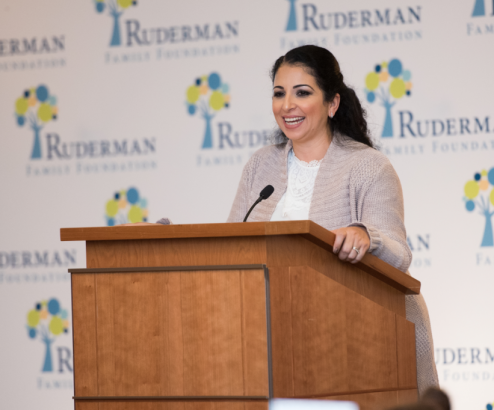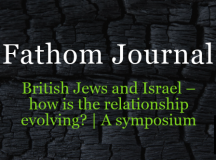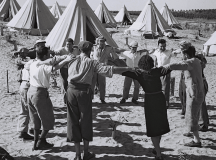Shira Ruderman argues that the coronavirus virus has presented Israel, the Nation State of the Jewish people, with an opportunity to redesign and strengthen its relationship with the Jewish Diaspora.
Historically, the State of Israel has played two roles: It is a country devoted to the Jewish People, regardless of their citizenship, and it is a country devoted to all its citizens – regardless of their religion or nationality. Sadly, while conversations about Israel’s relationship with its non-Jewish citizens are held on a daily basis, the much-needed discussion about Israel’s relationship with non-citizen Jews is not part of the public discourse. At times it seems the distance, time differences and language or cultural barriers are the main reason. However, the lack of public discourse highlights a much deeper problem. Today, 72 years since Israel’s inception, we have yet to answer the basic question: What are Israel’s roles and responsibilities towards Jews who aren’t citizens of the state?
Since the 1950s the most obvious legal formulation to Israel’s identity as the Jewish Nation State was the Law of Return, which opens with an overarching statement: ‘Every Jew can immigrate to Israel’. For years, encouraging Aliyah (immigration to Israel), as well as fighting antisemitism, were the two fields in which Israel realised its relationship with Diaspora Jewry. Founding father David Ben-Gurion’s ethos of ‘negating the exile’ and ‘forming a new Jew’ were the dominant schools of thought. Israel’s public education system taught about Jews who were expelled (from Spain and England), murdered (in European pogroms, Iraqi Farhuds, or the Holocaust) and made Aliyah (illegally under the British Mandate or legally after 1948). Israelis graduated from 12 years of school without having learned about the majority of Jews: those who choose to live outside of Israel and continue to sustain and create vibrant Jewish life in thriving communities.
Seventy two years on from Israel’s establishment, it is still unclear what role Israel sees for itself regarding Diaspora Jewry.
This large question significantly resurfaced during the COVID-19 pandemic. In many countries, Jews were disproportionately hurt. Some 400 people have died in the 300,000-strong British Jewish community, accounting for 5 per cent of all COVID-19 deaths in the country. Communities in France and Morocco also suffered greatly. And in the US, hundreds of Jews have died and thousands have been hospitalised. However, the pandemic has not only killed many individuals. It has also affected the communities, as schools, synagogues and other institutions have been shut down.
Additionally, the economic damage inflicted by the institutional closures will cost these Jewish communities dearly. Education is the most obvious example. Unlike in Israel, Jewish education around the world is private, with parents investing large sums of money to ensure their children’s Jewish literacy and future. According to various estimates, American Jewish schools are set to lose over $250 million from the plummeting income of these past few months and the inability of parents to pay tuition in the upcoming school year. Informal education – including youth movements, summer camps or ‘Birthright’ trips to Israel – have also been cancelled or drastically reduced.
As COVID-19 continues to take a toll on Jewish communities, should Israel increase its involvement? Assuming the relationship between the sides is based on mutual responsibility as the Talmud states – ‘all of Israel [i.e the Jewish people] is responsible for one another’ – the answer should be affirmative. Over the years the American Jewish community, as well as others, supported Israel. An estimated $1 billion is transferred annually from the US to Israel in large donations. According to a study by Brandeis University and Tel Aviv University, Israel’s higher education and health sectors are the greatest beneficiaries of these donations between 2000-2015, with $1 billion and $706 million, accordingly. During emergencies, such aid increases. For example, after the 2014 Operation Protective Edge, the US-based friends of Magen David Adom raised over $25 million for Israel’s new blood bank.
Despite the theoretical mutual relationship over the years, Israel has almost always been on the receiving end. Rare cases in which Israel provided aid to Diaspora Jewry can be found during Naftali Bennett’s tenure as Minister of Diaspora Affairs. In 2014-16, Israel helped the Ukrainian community as the country was fighting a civil war, and in 2017 it transferred emergency funds to the Jewish community in Houston, Texas, after Hurricane Harvey devastated its community institutions. These are exceptions to the norm, but also indicators to the change occurring: Israel’s economic and diplomatic growth have decreased its dependency on foreign aid, including Jewish donations, and allowed it to provide more assistance to others – including Diaspora communities.
As of June 2020, three months since the COVID-19 outbreak, thousands of communities in dozens of countries are suffering. Israel should shoulder some of the burden and help where it can. Obviously, the coronavirus pandemic has hurt Israel and its economy. It is unrealistic to expect Israel to send hundreds of millions of dollars overseas, and even if it were possible, it would not be the right thing to do. However, Israel does have a varied toolbox and proven track record on several fronts. Both should be at the disposal of communities in need or want, as they can greatly assist Diaspora Jewry without deflating Israel’s resources. Moreover, partnership and cooperation help defuse some of the tensions often associated with the Israel-Diaspora relationship, around political or religious differences. Removing these obstacles from the discourse can help strengthen the feeling of mutual responsibility, the bedrock of any interaction between Jewish communities in Israel and around the world.
In light of this, the following is an initial, albeit partial, list of ideas for Israel to act on during the COVID-19 pandemic or any other time of crisis
Creating Communal Resilience
The current crisis exposed Jewish organisations’ lack of preparedness to deal with continuous crisis and challenges. These groups had protocols in place for specific cases of safety or security challenges (which sadly were made even more necessary as synagogue shootings and other antisemitic incidents increased). Federations, synagogues and JCCs were not prepared to deal with an ongoing crisis, hitting the community across the board, at multiple places, at the same time.
In contrast, Israel has functioned as a country with a proactive (and experienced) civil society. Due to its unique circumstances, over the years Israel developed models of creating communal resilience and dealing with an ongoing and changing crisis landscape. This is not only true for the work of first responders and emergency crews, but also civil society and many organisations, from Lev Ehad’s control rooms to volunteers distributing food and medical supplies under the guidance of the community centres. These abilities need to be translated and adapted to help Jewish communities in the Diaspora build their own communal safety nets. When such infrastructure is built ahead of time, communities will be able to work more effectively during emergencies.
Accessible, Online Jewish Education
Even before the coronavirus pandemic, Jewish schools around the world – especially in the US and other places without public funding – faced huge challenges. One of the most severe challenges was finding talented, qualified and motivated teachers, as well as facing economic hardships. As mentioned, schools were one of the first to be hit by the current crisis. However, the same social restrictions which hurt the schools forced them to develop and upload materials online. Globally, we are talking about many hundreds of classes and curriculum, suitable for various ages and backgrounds.
These materials have tremendous potential. It is a treasure trove of Jewish educational resources which can also be used when schools return to physical gatherings. It is important to remember that less than 10 per cent of American Jewish children (excluding those from ultra-Orthodox communities) attend a Jewish day school. In England, Australia, France and other communities, there are tens of thousands of children not enrolled in Jewish schools. The newly created materials can serve them all.
For this to happen, a professional and central body is needed. This is where proper cooperation between the communities and the Israeli government can produce innovative results useful for school-aged children – in the Diaspora and in Israel. Like in the Jewish world, Israel’s Minister of Education developed an online curriculum, including in the fields of Zionism, Jewish studies and Jewish history. These can be translated into other languages, and the materials from overseas can be translated to Hebrew. By working efficiently and strategically, Israeli ministries can collaborate with Jewish organisations to produce quality, accessible and online content for every interested family – regardless of its location or financial needs.
Local Tikkun Olam Initiatives
Every year, thousands of young Jewish professionals volunteer in projects under the umbrella title of ‘Tikkun Olam’ (repairing the world), including work in Nepal, Ethiopia and other countries. Recently, the Ministry of Diaspora Affairs – under MOSAIC UNITED[1] – launched a project to support such initiatives. Understanding that international flights are going to be reduced for the foreseeable future, this situation requires Jewish communities and organisations to develop programmes closer to home.
Here too, there is an Israeli model which can serve as guidance for the Diaspora communities: shnat sherut, a year of service, taken upon themselves by hundreds of high-school graduates as a gap-year of volunteering before their military service. These enthusiastic volunteers are in hospitals, schools, old-age homes, shelters, youth movements and any other place that can use help. Over dozens of years, Israeli authorities and organisations have developed best practices for screening and working with 17 to 19-year-old youths, leaving home for the first time as they face what can be the harsh realities in society. These models can be shared and adapted, allowing Jewish communities to channel the energy of their younger members to contribute close to home.
Collaborative Philanthropy
Naturally, the philanthropic world works first and most among those closest to the home and heart of their donors. The Talmudic passage ‘the poor of your city come first’ is not necessarily a commandment, but an acute reading of reality. People tend to support initiatives and organisations close to them, mainly due to the need to prioritise resources – which are always limited. The current crisis demonstrates this vividly. In Israel, we see a sharp and welcome increase in the will of local philanthropists to give and help. As someone long involved in the Committed to Give initiative, I can testify to the change this reflects in Israeli DNA. In Diaspora communities, belonging to a community and donating to it, through membership fees or other contributions, go hand in hand – in Israel, it is a growing practice. At the same time, Jewish philanthropists are donating to their local emergency services, not necessarily Jewish causes: they support hospital workers, first responders and anyone fighting to save lives in these trying times.
Alongside these projects are those initiatives aimed at bridging the gap between Israel and the Jewish Diaspora, such as Taglit-Birthright, youth delegations and more. These too will be affected by the economic crisis developing before our eyes.
It is this challenge that creates opportunity: Israel has abundant red tape – legal, bureaucratic and otherwise – which stems the growth of local philanthropy. Jewish communities, on the other hand, especially in the US, have enduring models encouraging large-scale giving. Joined thinking between both parties can help Israel develop new philanthropic models, as well as creating and strengthening philanthropic partnerships between the sides.
Integrating the ultra-Orthodox in the Conversation
One of the shared challenges between Israel and the American Jewish community, and to a lesser extent for other Diaspora communities, is that the ultra-Orthodox population is often ‘forgotten’ or left out of the conversation — ‘remembered’ only when arguments arise over issues of religion and state. The fact that the ultra-Orthodox were hurt badly by COVID-19 in England, Israel, New York and elsewhere highlights their being part and parcel of the wider Jewish community.
This is also interesting since there are many places where the ultra-Orthodox community in Israel interacts with ultra-Orthodox communities outside of Israel, at times with similar practices and at other times with differing agendas. In fact, one of the most effective ways to change behavioural patterns in the Israeli ultra-Orthodox world during the onset of COVID-19 was using the names and pictures of ultra-Orthodox Jews who had died around the world. The Israeli government turned the tide using posters featuring images from Lakewood, Crown Heights and Borough Park – in Bnei Brak and Mea Shearim.
Ultra-Orthodox communities were hit badly and needed help. Images of IDF soldiers distributing food in Bnei Brak, and of Beis Yaakov girls thanking the men in green uniforms, reminded Israelis that differences can be pushed aside for a greater cause. We can hope that this remains with us in the months and years ahead. Connecting all parts of the Jewish world to the conversation is crucial, because our whole is larger than the sum of its parts.
Creating a Central Forum for Roundtables
To deal with the current crisis and the challenges yet to come, the government of Israel – headed by the Prime Minister’s Office – needs to convene a roundtable that will allow the relevant parties to properly discuss reality, and think of the best way forward. A recent survey by the Ruderman Family Foundation shows that most Jewish Israelis support the creation of such a forum.
For this initiative to work, the roundtable must include representatives from all relevant government ministries, civil society organisations, members of the philanthropic world and other actors invested in this space. However, the success of an emergency table will be larger than dealing with the current pandemic: by working together now, we can lay the groundwork for working together next month, next year and next decade, through open and frank conversations. This framework acknowledges differences but is not afraid to focus on common ground.
These six examples are only the tip of the iceberg, which is full of endless potential for us to leverage the current crisis and turn it into a historic opportunity in which we redefine the relationship between Israel and the Jewish Diaspora.
In July 2018, the Israeli government legislated a basic law defining Israel as the Nation State of the Jewish People, with Section 6 of the law dedicated to Israel’s relationship with the Jewish People. The first segment of the section isn’t surprising, as it discusses the need to fight antisemitism and those persecuted ‘because of their Jewishness.’ However, the next parts are new. They spell out Israel’s responsibility ‘to preserve the connection between Israel and members of the Jewish People,’ as well as its commitment ‘to safeguard the cultural, historical and religious heritage of the Jewish People in the Diaspora.’ Seventy years after Israel’s inception, the government started dealing with its obligations and interactions with those Jews who choose to live – and thrive – in the Diaspora. The coronavirus pandemic can provide leverage to strengthen and enhance this trend, as well as establish a wide strategy for Israel’s relationship with Diaspora Jewry.
Utilising the COVID-19 crisis as a vehicle for transformation can provide the Jewish world with the option of regrouping – not only at the local level, but also at a more structural one. We should all think of how we want to see the relationship between Israel and Jewish communities, and act to steer ourselves in that direction. We cannot miss this opportunity: to establish a true dialogue between Israel and the Diaspora in regular times and understand the role each can play during an emergency. Taking the present moment to think and develop these ideas will not only help in the foreseeable future, but will allow us to create a healthy, mutually beneficial relationship between Israel and the Diaspora for years to come.
Endnotes
[1] Full disclosure: Shira Ruderman is a member of MOSAIC UNITED’s advisory board.






































